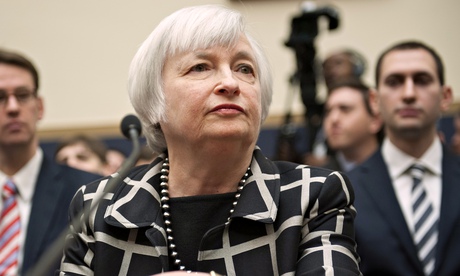Governments must heed the warnings of our brightest minds and reshape our societies to help those most in need

Last week, the world’s stock and bond markets swung wildly. They worried about the threat of world deflation, falling oil prices and further systemic weaknesses in the financial system. But perhaps they were most concerned about whether spooked governments had the will to do anything, even if those governments could agree on what that should be. If they can’t manage a co-ordinated response to Ebola or one against the cruelties of Isis, then it is hardly likely they are going to find common ground in managing the fissures in the world economy.
It is not as though there is not the beginning of a policy and intellectual consensus about what is wrong. Inequality is increasingly understood to be poisoning everything; governments cannot continue with business as usual policies; interdependencies have to be recognised and acted on. The problem is doing any of it.
Thus only last week, Janet Yellen, chair of the US Federal Reserve, joined one of her predecessors, Alan Greenspan, and the governor of the Bank of England, Mark Carney, in arguing that the growth of inequality was not only wrong morally but having increasingly baleful economic consequences. Then there were the strictures of the managing director of the IMF, Christine Lagarde.
Inequality, they all say, fosters fear, creates too much demand for credit to compensate for squeezed living standards, drives asset price bubbles, catalyses financial instability, weakens banks and, by displacing too much risk on to those who cannot bear it, undermines the legitimacy of capitalism. You have to blink with incredulity – and then blink again at markets falling because they want to see purposeful government action.
But governments everywhere seem paralysed, relying on central bankers’ promises not to raise interest rates to keep everyone calm and buy time for a few more months. No electoral majority can be mustered for even common sense, centrist radicalism that might address inequality or put economies stricken by the legacy of too much private debt and low demand back on their feet. They are stymied by their terror of going beyond the comfort zone of business as usual, as if the world had not changed after the financial crisis. It demands thinking – and doing – the hitherto unthinkable. Austerity remains the conventional wisdom.
In any case, rightwing populists challenge any such imaginative action as wrong. It’s not the aftermath of the financial crisis that’s the problem for them. It is foreigners, immigrants and the EU. We don’t need to look out for others, act purposefully to reshape our economies to lower inequality or accept interdependencies, declaim the world’s Nigel Farages. We are going to look out for number one, lock out foreigners and the rest of the world will meekly accept our assertion of self-interest.
This incubus goes far beyond economics. Thus the Ebola crisis has been gathering force for over a year. But it has taken the prospect of 10,000 new cases a week by December in Liberia, Sierra Leone and Guinea for it to become a global threat. It’s taken this to shock world governments into a response that even now is grudging and inadequate. To stem the epidemic, burials have to be safe and more than 70% of new sufferers immediately isolated, but for that there has to be a vast expansion of the health infrastructure, along with thousands of doctors and nurses.
West Africa has neither, nor is any crash mobilisation yet in prospect. Governments have been more preoccupied with stopping cases arriving in Europe, Japan and the US than getting involved in the messy and expensive business of tackling Africa’s health inequalities, the root of the epidemic. Only in the past week has there been some movement, with Britain committing £125m to Sierra Leone and others beginning to make common cause. But only $100,000 of the $1bn UN fund has been subscribed. The reality of interdependence, even before a global epidemic, is hard to accept.
If this is hard, it is much harder to accept the interdependency of global finance and beyond that the interdependencies of whole societies such as our own. Nobody is dying a horrible death. But it is very striking how difficult it is to convince the financial, political and intellectual elite that what happened in 2008/9 changed everything. For a generation, western societies in general, and Britain in particular, relied on the massive growth of private credit to mask the dysfunctionality of their capitalism. There was too little attention paid to ensuring the mass of people had economic opportunity in businesses that invested, innovated and grew. The assumption became rooted that the state was the problem and that business and markets would provide, which they could as long as private debt levels doubled every 20 years.
What is so chilling about George Osborne’s approach to running the economy is that he really believes he can go back to those times. So do Republicans in the US and so in her way does Angela Merkel. As Martin Wolf, chief economics commentator of the FT, writes in his magisterial account of today’s global economy, The Shifts and the Shocks, the elites have not been disabused of the notion that global finance can continue as before. The vast overhang of private debt is depressive, he argues. Governments must spend and borrow more for perhaps another decade. Central banks must continue with extraordinary monetary policies. Banks and banking need wholesale reform. Deflation, not inflation, is the threat.
Wolf applauds the world’s governments for acting so positively for 18 months after the crisis – and lambasts them for thinking all was well too soon and cutting spending when the co-dependency of state and market and need for extraordinary measures have never been more apparent. The result is self-defeating secular stagnation threatening to topple into worse – in essence, this is what spooked the markets last week.
Finance needs further reshaping; we need purposeful action to lower inequality, which will involve raising taxes on the wealthy, while governments have to borrow and spend, with infrastructure spending being an easy win. Parallel policies are needed abroad.
Europe or foreigners are not the cause of our ills. Ukip and the Tory right will make things worse, not better. Just as the best in the world can see what needs to happen in West Africa, so the best are dissociating themselves from the prescriptions of the right. Nigel Farage and the British right have to be understood for what they are: the political equivalent of Ebola – a virus that threatens our economic and social health.



